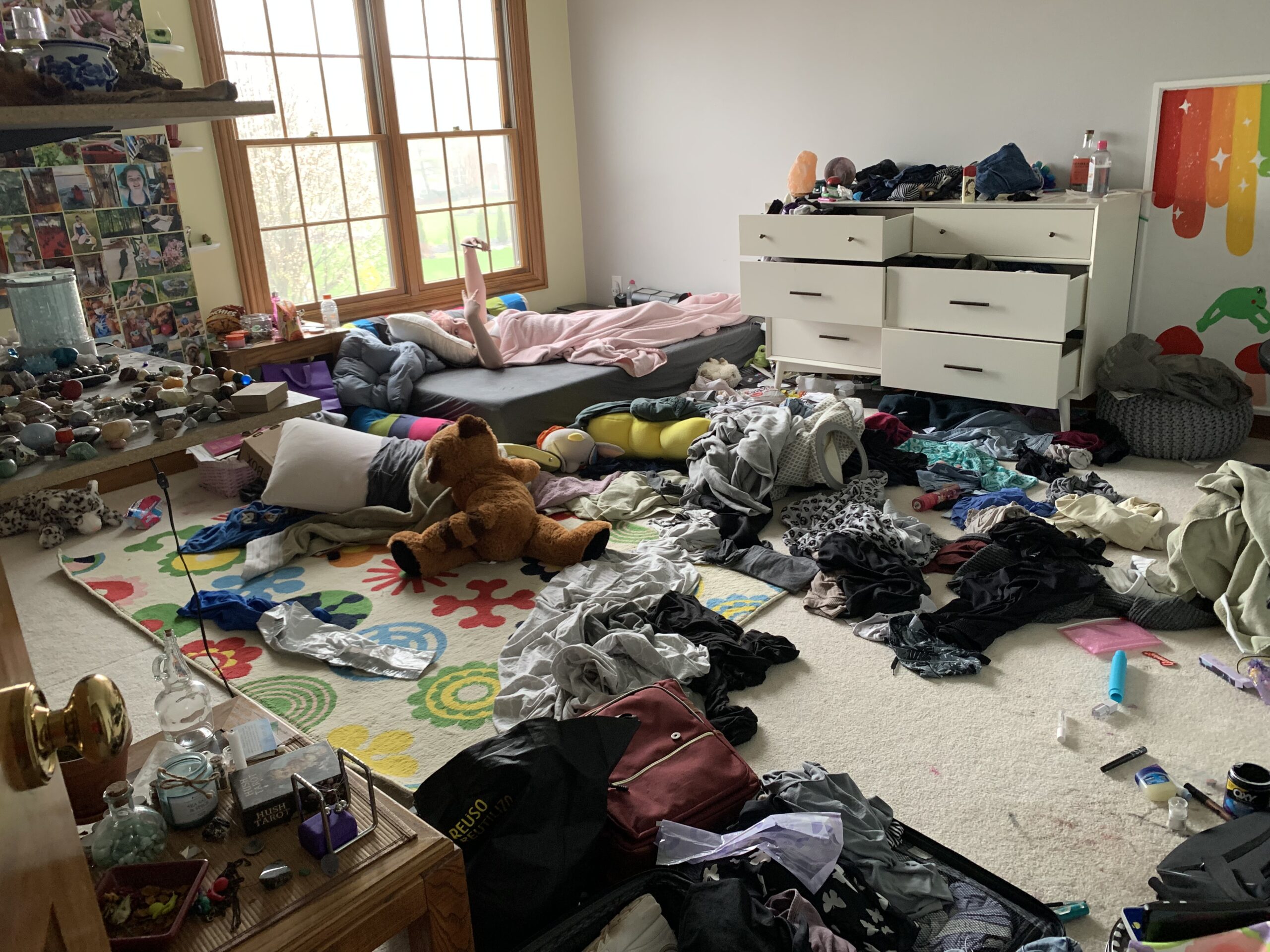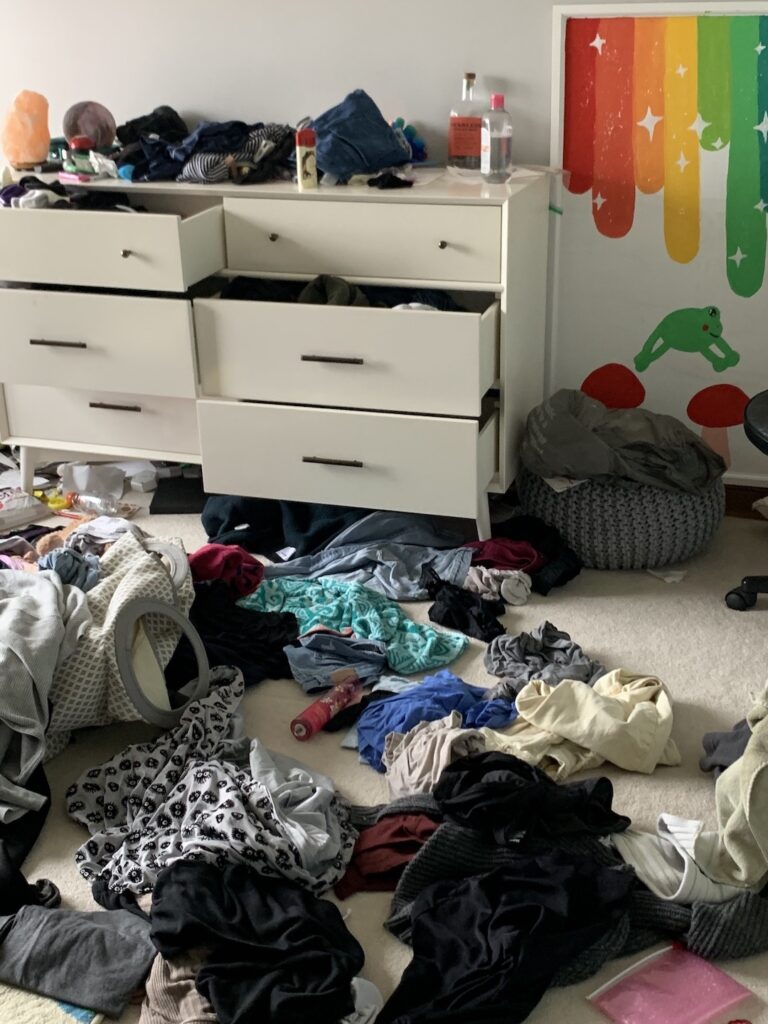I hate a messy room.
When my bedroom is messy, I usually clean it up right away.
I know from experience that I like my room better when it is neat and orderly. In fact, it’s pretty rare for me to ever let my room get untidy or messy in the first place.
As a kid, it wasn’t always this way. I remember my mom bugging me about needing to clean up my room. My clothes – both dirty and clean – would end up all over the bed and floor, along with random snack wrappers, art supplies and books.
My Mommers was always great at helping me clean my room if I asked – and sometimes even if I didn’t. But in general, I know she wanted me to keep my room tidier than I did.
I’m not sure how old I was when I realized that I prefer a clean room and that if I keep it tidy all the time, I won’t ever have to actually put time and work into cleaning it up. I’d guess I was probably in college or just before.
So why do we expect tweens and teens to keep their rooms clean when this is clearly a skill that comes with time, age and experience? Why are we so demanding of our kiddos when we ourselves as kids probably didn’t keep a clean bedroom?
Traditional parenting was done through threats and fear. Parents told children to clean their rooms “or else” and kids did it because they feared whatever “or else” meant. But that’s not how we’ve ever parented in our house.
With a gentle or positive parenting style, parents ask kids to clean their rooms without threats or punishments – and kids may or may not comply. If they don’t, there are natural consequences (i.e., a messy room) that hopefully, ultimately motivate them to get on board.
In our case, the gentle or positive parenting approach and natural consequences haven’t helped with Journey’s room. I think our issues are bigger than that.
Journey has gone through phases with her room. She actually went through a period in elementary school where she was obsessive about keeping her room tidy and wouldn’t let anyone go in there to touch anything. This made playdates really challenging!
These days, tween Journey is out of that perfectly neat room phase and into the messy room phase. She isn’t great at keeping things picked up day-to-day, so then the room becomes like a tornado zone and it feels overwhelming to pick it all up. It feels like a massive, insurmountable task.
I get it; when I peek in the door of Journey’s room, I’m overwhelmed, too!
It’s important to note that our kiddo is not an ordinary, typical child. Journey is neurodiverse in many ways, from being highly sensitive to struggling with extreme anxiety that can almost present as a form of autism. Bottom line, the kiddo has enough on her plate. She does not need overly critical parents riding her about keeping her room clean.
Yelling at or nagging Journey about something does NOT work. Neither do consequences like taking her phone away until the room is clean. These parenting methods make us both frustrated and ultimately only serve to harm our relationship and connection. Negative tactics do not get her to clean up her room.
We have also tried making a positive behavior chart with rewards for cleaning her room daily and weekly. This seemed like it might work – she seemed to receive it somewhat favorably – but in the end, even the proposed rewards did not motivate her to keep her room clean or tidy up a messy room.
So what works? What gets our amazing, brilliant, unique child to take a few minutes each day to pick up her clothes and belongings so that her room can stay neat and tidy?
I don’t know. Honestly, we haven’t figured this one out yet. But I think the secret is in letting go.
Sometime this year, I realized that I just need to let the messy room go. Does it really matter in the grand scheme of things? Journey’s a great kid. She has been through a lot – she deserves a break. She keeps the door closed anyway. Can’t I just let it go until she asks me for help cleaning it?
We have learned that if we share how we feel in a reasonable, calm and connected way, it might not motivate Journey to take action right that second, but eventually she will come around.
Journey knows we’d like her to keep her room tidier. Heck, catch her in a quiet moment and she might even admit that she prefers a clean room herself! It just feels like an overwhelming hassle to get it that way once it’s already full of clothes and clutter.
But if we let her figure things out in her own time, Journey almost always comes around. The other day, she told me that her messy room has been really bugging her and she would love my help to tidy it up. I was thrilled to be asked.
I know that when we clean her room together, we’ll play music and dance around. We’ll make it fun. We’ll find some things to donate, some things to throw away and we’ll get all the clothes back where they belong. I’ll end up with a huge pile of laundry to do, but that’s okay.
She’ll throw her arms around me, laugh and thank me. She’ll feel relieved when it’s done. She’ll also feel supported and loved, just like I always felt supported and loved by my own mom when she helped me clean my room – or when she made my bed for me even though I was perfectly able to make it myself.
With parenting, it’s about the journey (in our case, literally!) We have to learn to let go of the little things – like whether our kid’s room is tidy or not – in order to show love, compassion, forgiveness and acceptance.
So how do you get your neurodivergent tween to clean her room? I’m not sure you need to. Instead, reflect for a bit on why it’s so important to you. It’s not your room – it’s hers. Is it really the end of the world if it’s messy? Could you offer to help, then sit back and wait until she’s ready? Can you let her know you love her unconditionally, messy room and all?
I don’t claim to have all the answers here – or even any answers – but I do hope this was somewhat helpful.
And now I’m going to knock on Journey’s door and see if she’ll let me collect some dirty clothes in a hamper so we won’t have as much to do when she finally asks me to help her straighten up her room.




